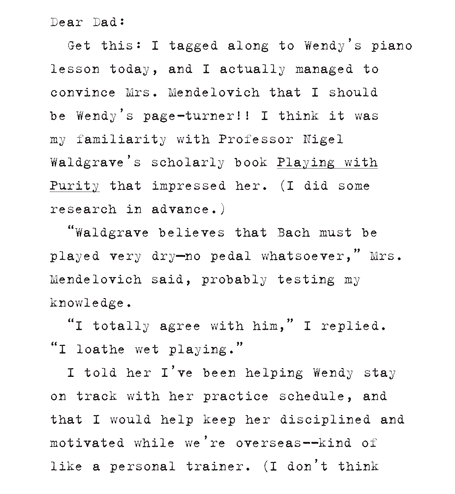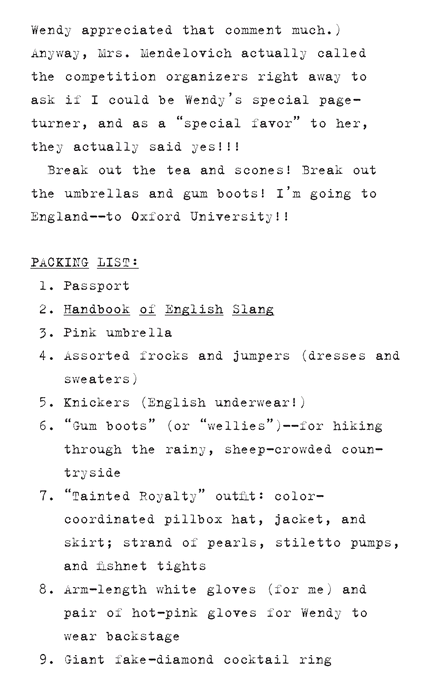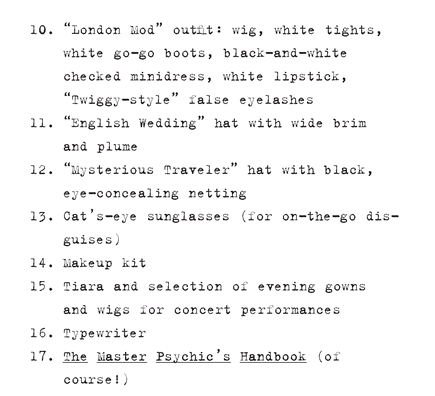The Ghost Sonata (3 page)
Authors: JENNIFER ALLISON

“Wendy, don't you even want to take a look at these pictures? Can you believe you'll be in Oxford in a matter of days? You are so lucky!”
Wendy turned around on the piano bench to face Gilda. “Look, I'm not going there to slurp tea and stuff my face with clotted cream. I'm actually scared out of my mind. Just look at this!” Wendy thrust a piece of paper at Gildaâthe competition rules and guidelines. “I don't think you realize how much pressure these competitions are, Gilda.”
FIFTH ANNUAL YOUNG INTERNATIONAL VIRTUOSOS PIANO COMPETITION
Congratulations! Based on your outstanding audition tape, you have qualified to compete in the Young International Virtuosos Competition!
Â
Five years ago, internationally renowned pianist Eugene Winterbottom decided to create a new opportunity for talented young pianists to launch their careers and gain international exposure, and the first Young International Virtuosos Competition was held at Oxford University. Since then, the competition has been held in Prague, Paris, and Stockholm. This year's competition returns again to the United Kingdom, to be hosted by the music faculty of Oxford University.
Â
PERFORMANCE REQUIREMENTS
At the time of their audition, performers must demonstrate an ability to perform music from four major artistic erasâa work of baroque music, a classical work, an impressionistic or Romantic piece, and a work by either a late twentieth-century or a contemporary twenty-first-century composer. A list of acceptable composers and compositions is available. In the first round of the competition held at Holywell Music Room, two works from eras of the pianist's choice must be selected for performance. The event is open to the public.
Â
The Sight-Reading Test:
The first-place winner of the Young Virtuosos Competition will demonstrate well-rounded, professional-level skills. For that reason, a sight-reading test is also part of the competition, and abilities to quickly learn music are factored into judging decisions.
Â
Finalists:
Finalists will perform one of their selected compositions for an audience at the Sheldonian Theater. Tickets will be sold to the public for this event.
Â
Page-Turners:
* The competition organizers will make every effort to provide a page-turner for the sight-reading portion of the competition if needed, but availability is not guaranteed.
Â
JURORS
RHIANNON MADDOX
Born in Wales, Professor Maddox studied at the Royal Academy of Music in London, where she now teaches. Much in demand both as a recording artist and as a performer with major symphony orchestras across Europe and in the United States, Professor Maddox is known for her experimental and boundary-breaking approach to piano performance, and she often includes works of pop music and jazz in concerts that feature more traditional classical works. She has collaborated and recorded with a broad range of musical artists, from famed cellist Yo-Yo Ma to pop star Madonna.
Â
NIGEL WALDGRAVE
Professor Waldgrave completed his studies at the Royal Academy of Music in London and made his concert debut on the London stage after winning the Leeds Competition. Professor Waldgrave retired from the concert stage following a hand injury and has subsequently become a respected music historian and critic. He is the author of numerous books, including
Playing with Purity: Staying True to the Masters
and the popular pet-care book
A Cat's Music Companion.
Playing with Purity: Staying True to the Masters
and the popular pet-care book
A Cat's Music Companion.
Â
EUGENE WINTERBOTTOM
Founder of the Young International Virtuosos Competition and an internationally renowned performer, Winterbottom's performances and recordings of Rachmaninoff, Ravel, and Chopin piano concertos have been celebrated with both popular and critical acclaim. He is also known for his unique approach to piano pedagogy; his master classes and workshops are highly sought-after.
Â
Professor Winterbottom will adjudicate the final round of the competition.
PRIZES
The winner of the competition will receive a concert engagement with the London Symphony Orchestra. The winner will also receive a five-thousand-pound cash prize.
Â
*Under special circumstances, accommodations and travel expenses may be provided for competitors who wish to bring their own page-turners due to special needs. A request to the competition organizers must be submitted in advance.
Â
As she read about the competition, Gilda felt annoyed that her mother was rightâthe day
had
finally come when she actually regretted giving up piano lessons. Everything about the competition sounded magical and exciting: she loved the sound of places like Holywell Music Room and the Sheldonian Theater. If only
she
were the one who could play the piano brilliantly! Gilda imagined herself amazing English audiences, then meeting people like Rhiannon Maddox and Eugene Winterbottom for tea and scones following her performances.
had
finally come when she actually regretted giving up piano lessons. Everything about the competition sounded magical and exciting: she loved the sound of places like Holywell Music Room and the Sheldonian Theater. If only
she
were the one who could play the piano brilliantly! Gilda imagined herself amazing English audiences, then meeting people like Rhiannon Maddox and Eugene Winterbottom for tea and scones following her performances.
“My knees went weak when I heard your performance,”
Eugene Winterbottom would say.
Eugene Winterbottom would say.
“Brilliant!”
Rhiannon Maddox and Nigel Waldgrave would declare.
“And to think you only started playing piano a few months ago!”
Rhiannon Maddox and Nigel Waldgrave would declare.
“And to think you only started playing piano a few months ago!”
“Wendy, I think this competition sounds amazing,” said Gilda.
“It sounds scary.”
“You've done this before, Wendy. You
always
do well.”
always
do well.”
“Everyone always assumes âWendy
always
does well.' What about the one time I
don't
do well?”
always
does well.' What about the one time I
don't
do well?”
“When that one time happens, we'll just pretend we don't know you.”
“You're beginning to annoy me right now, you know that?”
“Wendy, you know you could sit up there and play nothing but âTwinkle, Twinkle, Little Star' and I'd still think it was fantastic.”
Wendy sighed. “That doesn't make this less scary, Gilda.”
Gilda didn't understand Wendy's fear. Ever since elementary school, Wendy had played piano in the school talent show and accompanied the choir and instrumental soloists. She did all of this without making any mistakesâat least not any noticeable ones. Sometimes she disappeared for a weekend, and afterward, a new, framed certificate from a competition she had won would appear on the bulletin board in her bedroom. To Gilda, Wendy's musical abilities seemed like an inevitable part of her best friend's being. It was hard to imagine why she would be afraid of playing in front of others when all of her efforts seemed to bring success.
Wendy began a series of angry, impatient-sounding arpeggiosâdifficult four-interval exercises Mrs. Mendelovich had prescribed to strengthen Wendy's weak fourth fingers.
Gilda turned back to the Young International Virtuosos Competition information and noticed something in the guidelines that triggered a delightful tickle in her left earâher personal psychic signal that
something interesting
might be about to happen: “Under special circumstances, accommodations and travel expenses may be provided for competitors who wish to bring their own page-turners due to special needs . . .”
something interesting
might be about to happen: “Under special circumstances, accommodations and travel expenses may be provided for competitors who wish to bring their own page-turners due to special needs . . .”
“I've got it Wendy!” Gilda shouted over Wendy's arpeggios. “I just figured out how I can go to Oxford with you!”
Wendy stopped playing and regarded Gilda impatiently. “How?!”
“Meet your official page-turner: Gilda Joyce!”



4

Bad Omens, Good-Luck Charms
Â
Wendy walked alone, following a narrow cobblestone street lined with row houses. She gradually became aware of a steady clicking soundâthe echo of footsteps from a short distance behind. She walked faster, and the pace of the stranger's footsteps also accelerated.
Someone is following me
, she thought in a rush of panic.
Someone is following me
, she thought in a rush of panic.
Wendy whirled around to face the person trailing her, but the street was empty. In the yellow lamplight, shadows shifted in the doorways and alleys. She turned to continue walking and felt a dull ache in her stomach as the sound of footsteps immediately resumed.
Faint strains of piano music wafting from a building just ahead gave Wendy a sense of hope and relief.
I must be getting close to the practice rooms
, she thought. Hearing the chaotic tangle of scales and arpeggios, she felt reassured that other people must be nearby; she wasn't completely alone on the dark street after all.
I must be getting close to the practice rooms
, she thought. Hearing the chaotic tangle of scales and arpeggios, she felt reassured that other people must be nearby; she wasn't completely alone on the dark street after all.
But something was wrong: the piano music seemed too eerily familiar. Wendy realized she was listening to fragments of the very pieces she would perform the next day at the competition.
She found herself wandering through a hallway lined with practice rooms, and was surprised to find them all empty, their doors left open with only upright pianos and vacant piano benches inside.
The door of the last practice room in the hallway was closed. Wendy approached the room, then stood on tiptoe and peered through the small glass window in the door. A boy sat at the piano inside, practicing Mozart's D Minor Fantasyâa piece Wendy also planned to perform. Something was odd: it seemed that his hands weren't quite moving in time with the notes he played. Wendy felt a deep forebodingâthe sense that some awful truth was right before her eyesâsomething she didn't want to let herself acknowledge.
He's dead
, a voice told her.
, a voice told her.
He turned to look at her through the small glass window in the practice room door. Her heart sank as he waved to her.
Â
As usual, Wendy awoke from the dream feeling that somethingâor
somebody
âwas nearby, waiting for her. She buried herself under the covers, then threw them off with an abrupt violence, as if hurling the blankets at the shadowy nightmares that lurked in the corners of her immaculate bedroom. She swung her legs over the side of her bed and rubbed her eyes, trying to scrub away a burgeoning headache. With her chin resting on her fists, Wendy stared at her open suitcase on the floor. The suitcase was packed with neatly folded clothes and stacks of piano music. Wendy seemed transfixed by the luggage, as if it were a window through which she could view some interesting scene from her future.
I'm flying to England tonight
, she told herself.
By tomorrow morning, I'll be far from home, riding in a bus from London to Oxford.
somebody
âwas nearby, waiting for her. She buried herself under the covers, then threw them off with an abrupt violence, as if hurling the blankets at the shadowy nightmares that lurked in the corners of her immaculate bedroom. She swung her legs over the side of her bed and rubbed her eyes, trying to scrub away a burgeoning headache. With her chin resting on her fists, Wendy stared at her open suitcase on the floor. The suitcase was packed with neatly folded clothes and stacks of piano music. Wendy seemed transfixed by the luggage, as if it were a window through which she could view some interesting scene from her future.
I'm flying to England tonight
, she told herself.
By tomorrow morning, I'll be far from home, riding in a bus from London to Oxford.
Other books
Diesel (Aces MC Series Book 1) by Aimee-Louise Foster
Big Machine by Victor Lavalle
Deadrise by Gardner, Steven R.
Are You Experienced? by Jordan Sonnenblick
Slow Burn: A Colorado High Country Novel by Clare,Pamela
The Last Best Kiss by Claire Lazebnik
Seal All Exits (Tangled Web #3) by Jade C. Jamison
A Dom and His Not So Submissive Sub by James, Taki
Presa by Michael Crichton
